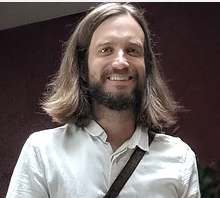“How the ‘Agency and Intentions in Language’ Conference Will Expand Your Thinking,” by Kyle Thompson
November 11, 2021
Imagine that the CEO of a company learns that implementing a new policy will harm the environment and also make the company lots of money. The CEO then says: “Implement the policy—I don’t care about the environment, I just want to make money.” Did the CEO intentionally harm the environment? Most people would say “yes.” But now consider a slightly different scenario. This time, the CEO learns that a new policy will help the environment and also make the company lots of money. Again, the CEO proclaims: “Implement the policy—I don’t care about the environment, I just want to make money.” Did the CEO intentionally help the environment? Now most people would say “no.” But wait—why should we say that one act was done intentionally and not the other when the CEO’s actions were the same in both scenarios?
Puzzles like this one, derived from philosopher Joshua Knobe’s (2003) work*, point to interesting and challenging questions about concepts people use every day of their lives, concepts such as “intention,” “responsibility,” “agency” and more. For example, we often ask others to take responsibility for what they’ve done; we might apologize for wrongdoing by downplaying the consequences of our actions and emphasizing our good intentions; we defend a desire for agency when we ask not to be micromanaged.
On the surface, we all have a sense of what these concepts mean and yet, as Knobe’s puzzle reveals, there can be so much complexity underneath them. If the CEO is held more responsible when the by-products of her actions are harmful rather than helpful, then it seems that the common concept of “intention” is more than just ‘that which someone aims to do.’ In fact, the idea of acting “intentionally” has a lot to do with a person’s sense of agency—i.e., their sense of being able to freely carry out actions—coupled with their responsibility to other people in their community.
To explore questions related to agency and intentions, Harvey Mudd College will be hosting (virtually) the second annual “Agency and Intentions in Language” (AIL) workshop. What makes this academic conference so exciting is that it is interdisciplinary and international. The inaugural conference, hosted (virtually) at the University of Göttingen, brought together philosophers and linguists from around the world to share their perspectives on, well, you guessed it: agency, intentional actions, accidental actions, responsibility and more.
What you might not have guessed is how many fascinating questions link up with these concepts. For example, philosophers connect agency and intentions with questions of free will and moral responsibility. If a scientific worldview regards all events as fully caused by prior events, then how can we even make sense of a person acting intentionally or accidentally? It had to happen that the CEO would implement the policy, right?
Relatedly, psychologists explore how humans develop their sense of agency, and they seek to understand how a person’s sense of agency might be different in cases of schizophrenia or addiction. And the linguists have perhaps the hardest job of all: making sense of how all these questions and concepts are captured and managed in diverse languages and linguistic communities.
As an attendee and presenter for the inaugural workshop, I found it exhilarating to learn how folks outside of philosophy, my discipline, tackle the same questions I am interested in. As each speaker presented, I realized that I had totally underestimated the intrigue and complexity behind the very ideas I had spent so much time investigating in my own work. This shouldn’t have been surprising, though, as I wrote an entire dissertation (Thompson, 2019) on the relationship between the concepts “ought” and “can” and still had more I wanted to say!
To build on the success of the first “Agency and Intentions in Language,” this upcoming conference will feature an all-star, interdisciplinary cast of invited speakers:
- Linguist Magdalena Kaufmann (University of Connecticut)
- Psychologist David Pizarro (Cornell University)
- Philosophers Hannah Tierney (UC Davis) & Andrew James Latham (University of Sydney)
- Linguist Thomas Grano (Indiana University Bloomington)
So, mark your calendars for January 12 to 14, head over to the AIL workshop website to register for free, and get ready to drop by a few presentations on Zoom that will expand your thinking on concepts you use every day! At the very least, I hope you intend to do so.
For inquiries or comments about “Agency and Intentions in Language” (AIL) or the topics covered in this post, please contact me at [email]kthompson@g.hmc.edu[/email].
References
Knobe, J. (2003, July). Intentional action and side effects in ordinary language. Analysis, 63(3), 190–194.
Thompson, K. (2019). Ethics, x-phi, and the expanded methodological toolbox: How the think aloud method and interview reveal people’s judgments on issues in ethics and beyond (Publication No. 22621856) [Doctoral dissertation, Claremont Graduate University]. ProQuest Dissertations and Theses Global.
* Please note that the opening paragraph about the CEO’s policy decisions is a slightly modified paraphrasing of Joshua Knobe’s work. For Knobe’s original vignettes, see pages 191–192 of “Intentional Action and Side Effects in Ordinary Language.”
Kyle Thompson

Kyle Thompson is a philosopher, musician, husband, cat and dog owner, and optimist who teaches philosophy and writing. He believes that teaching should be both engaging and educational, and he works hard to bring both aspects into the classroom (in-person and online). He’s taught at a number of institutions and worked with students of all backgrounds and interests. He says, “I recognize that few students will go on to study philosophy at the graduate level and beyond, which means it is my responsibility to show them the value of philosophizing in a relatively short period of time.”